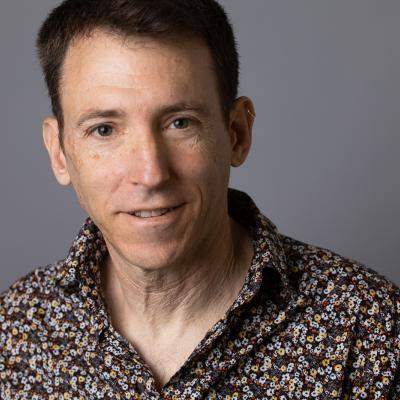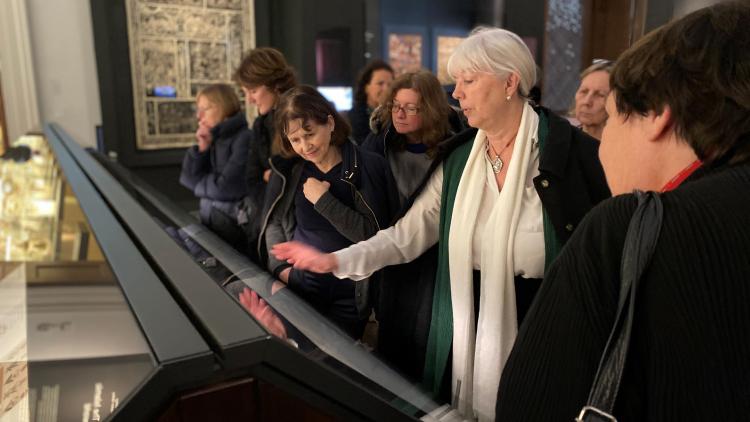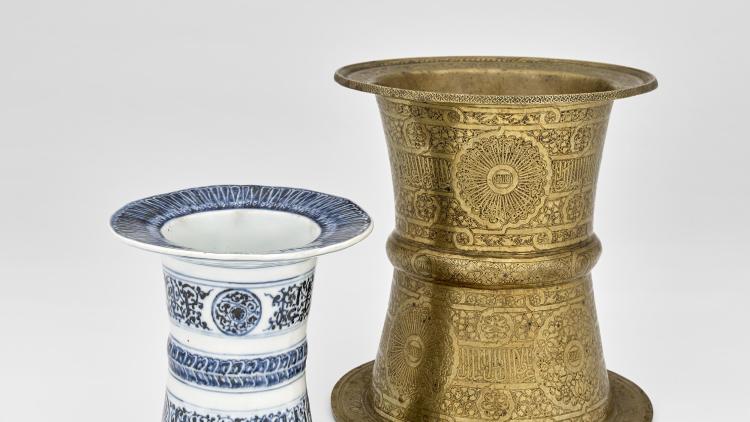Research Degrees (MPhil/PhD) in South East Asian Studies


Key information
- Duration
- 3 years full-time or 6 years part-time
- Attendance mode
- Full-time or part-time
- Fees
-
Home student fees (full-time): £4,860 per year
Home student fees (part-time): £2,430 per year
Overseas student fees (full-time): £22,490 per year
Overseas student fees (part-time): £11,245 per yearPlease note that fees go up each year.
See research fees for further details. - Entry requirements
-
We normally require a 2.1 bachelor's degree (or its equivalent) plus a Masters degree in appropriate subject area plus one reference. In exceptional cases we may accept applicants who do not meet these criteria if they show evidence of a strong Masters degree and/or appropriate level of relevant work experience. International applicants should also see Doctoral School English language requirements
Course overview
The South East Asia Section of the School of Languages, Cultures and Linguistics at SOAS offers the widest coverage in Europe of research and teaching related to the languages and cultures of the principal countries of South East Asia.
Its primary commitment is to the four languages Burmese, Indonesian/Malay, Thai and Vietnamese, and their literatures, cinemas and associated cultures. REF 2014 submissions by members of the Department included significant and paradigm-shifting monographs, edited collections, journal articles and book chapters in cinema and gender, literary criticism, cultural history and postcolonial studies. It is a flourishing and friendly Department with close links to recent alumni.
The research interests of the Department’s members include: classical Malay literature; modern literature in Malay, Indonesian, Thai, and Vietnamese; Islam in South East Asia; language pedagogy; phonetics; gender studies; oral literature and folklore; cinema in South East Asia; and translation. These interests are increasingly reflected in the kind of work that is undertaken by the Department’s current doctoral researchers.
A full research training programme is provided at Faculty level, in addition to the close attention each doctoral researcher receives from his or her supervisor. MPhil/PhD students admitted to the Department receive research training in the Faculty-wide first year research training seminar and are also encouraged to participate in discipline-specific training offered by the Faculty Centre for Cultural, Literary and Postcolonial Studies (CCLPS) and research skills training coordinated via the Doctoral School.
The Department provides supervision for both full-time and part-time doctoral researchers undertaking supervised research in a wide range of South East Asian languages and literatures. Theses completed in recent years have included topics in traditional Lao literature, contemporary Thai fiction, the syntax of spoken Mon, the shadow play in Bali, Malay oral literature, schoolbooks in colonial Burma, pre-Angkor Cambodia and political literature in Vietnam.
Under the regulations of SOAS, University of London, all doctoral researchers register initially for an MPhil: they may transfer to PhD after completing one year, if they wish and subject to approval by the School, which requires evidence that the candidate’s work is achieving the standard required.
The minimum duration for full-time doctoral researchers is two years for the MPhil and three years for the PhD. Part-time doctoral researchers normally take twice as long to complete their studies. When their research is completed, candidates submit a thesis to the examiners, and then attend a viva voce examination.
Applicants for postgraduate degrees must have a good command of the language of their field of study, and should normally have a good first degree in the appropriate subject, but students with other qualifications and experience may also be eligible, and applications from mature students are particularly welcome. If necessary for the development of their chosen subject, doctoral researchers will be expected to have or acquire an adequate reading knowledge of Dutch and/or French. All potential applicants are strongly advised to consult the Department before they apply. More general queries should be directed to the Department Research Tutor or to the Doctoral School.
Structure
All students register in year 1 of the programme as MPhil students. The upgrade from MPhil to PhD takes place at the end of the first academic session for full time students (or at the end of the second academic session for part-time students).
All new MPhil/PhD students are provided with a supervisory committee of three members, comprising a main or primary supervisor, and a second and third supervisor. The split in time commitment across the supervisory committee is 60:25:15. In the first year students are expected to meet their main supervisor on a bi-weekly basis for a period of at least one hour.
The student’s primary supervisor is always a member of the Department in which the student is registered. The second and third supervisors, who act in a supplementary advisory capacity, may be from the same Department, or other Departments/Centres in the Faculty of Languages and Cultures or in Departments/Centres in the other Faculties of the School.
Depending on the nature of the research, joint supervision is sometimes recommended, under the direction of two primary supervisors. In such cases the student has only one further supervisor on their committee.
The student’s progress is further overseen by a Departmental Research Tutor.
In the first year, students prepare for research by following a research training seminar series (RTS) convened at the Faculty level by the Associate Dean for Research and supported by the generic training offered by Learning and Teaching Development.
Students working in the fields of literature and cultural studies are also invited to participate in the additional training offered in the Centre for Cultural, Literary and Postcolonial Studies (CCLPS).
Students may also be encouraged by supervisors to attend additional taught courses relevant to their research and to their training needs. These may include specialist disciplinary, language or regional culture courses or research training in other Departments outside the Faculty.
Year 1
Year 1 full-time students (year 2 for part-time students) are required to submit a core chapter and research proposal (of about 10,000 words) by Friday 6th May 2016, typically including the following elements:
- Research rationale and context of proposed research
- Main research questions
- Literature review
- Theoretical and methodological framework and considerations
- Proposed research methods
- Ethical issues (where applicable)
- Outlining structure of PhD dissertation
- Schedule of research and writing
- Bibliography
Adjustments to one or more of these sections, including additions or deletions where appropriate, are possible by prior arrangement between the students and lead supervisors.
The upgrade process from MPhil to PhD status is based upon an assessment of the core chapter by the student’s research committee, and upon on a 20-30 minute oral presentation, followed by a discussion. The oral presentation is given to Departmental staff and research students as well as to the three members of the student’s supervisory committee who subsequently meet with the student privately for a mini viva of 30-40 minutes drilling down into the detail of the upgrade chapter. On successful completion of the extended proposal, students are formally upgraded to PhD and proceed to the second year. (If the assessors consider there to be shortcomings in the upgrade proposal, students will be asked to revise it to their satisfaction before the upgrade to PhD status can be confirmed.) Students are not normally permitted to proceed to the second year until the upgrade process has been completed.
Year 2
The second year (or part time equivalent) is normally spent engaged in research. This may be by any combination of fieldwork and research in libraries and material collection as agreed between the student and the supervisor(s).
Year 3
The third year (or part-time equivalent) is devoted to writing up research for the PhD thesis. During this time, students will normally give a presentation in a research seminar organised by the Departmental Research Tutor, comprising a select number of staff members with special expertise in the topic and other research students. During the third year (or part time equivalent) students will present draft chapters to their main supervisor for comment, before completing a final draft of the thesis. Once a full draft is complete, the work is assessed by all members of the supervisory committee and the student can either submit the thesis or move on to Continuation Status to be given a further 12 months to complete the thesis and submit for examination. The thesis must be completed within 48 months from the time of registration (or part time equivalent).
The thesis – not to exceed 100,000 words in length - is examined by two leading authorities in the field, one of whom is internal to the University of London and one of whom is external to the University.
PhD Degrees are awarded by SOAS from registration and are subject to SOAS regulations.
Important notice
The information on the website reflects the intended programme structure against the given academic session. The modules are indicative options of the content students can expect and are/have been previously taught as part of these programmes. However, this information is published a long time in advance of enrolment and module content and availability is subject to change.
Teaching and learning
Academic staff and their research areas
Dr Ben Murtagh BA MA (LONDON) PhD (LONDON) Head of Department
Traditional Malay and modern Indonesian literature; history of Indonesia; film in Indonesia and Malaysia; gender and sexuality in Indonesia
Dr Rachel Harrison BA PhD (LONDON)
Modern literary, cultural, film and gender studies with reference to Thailand; literary criticism and South East Asian Literatures in a comparative context; Western cinema set in South East Asia
Dr Dana Healy PhD (PRAGUE)
Admissions Tutor
Vietnamese language and literature, language teaching; folk literature, modern poetry, theatre, art
Dr Justin Watkins BA (LEEDS) MA PhD (LONDON)
Burmese language and literature; Khmer language; Mon-khmer and Tibeto-Burman languages; phonetics; computer lexicography.
Scholarships
Fees and funding
Fees for 2023/24 entrants per academic year
| Home students | Overseas students | |
|---|---|---|
| Full-time | £4,860 | £21,630 |
| Part-time | £2,430 | £10,815 |
Please note that fees go up each year.
See research fees for further details.
Employment
Graduates of the School of Languages, Cultures and Linguistics leave SOAS not only with linguistic and cultural expertise, but also with skills in written and oral communication, analysis and problem solving.
Recent graduates have been hired by:
- Africa Matters
- Amnesty International
- Arab British Chamber of Commerce
- BBC World Service
- British High Commission
- Council for British Research in the Levant
- Department for International Development
- Edelman
- Embassy of Jordan
- Ernst & Young
- Foreign & Commonwealth Office
- Institute of Arab and Islamic Studies
- Middle East Eye
- Saïd Foundation
- TalkAbout Speech Therapy
- The Black Curriculum
- The Telegraph
- United Nations Development Programme
- UNHCR, the UN Refugee Agency
- Wall Street Journal
Find out about our Careers Service.



